Robert Smalls' Legacy and Liberating Nature
Air Date: Week of June 21, 2024
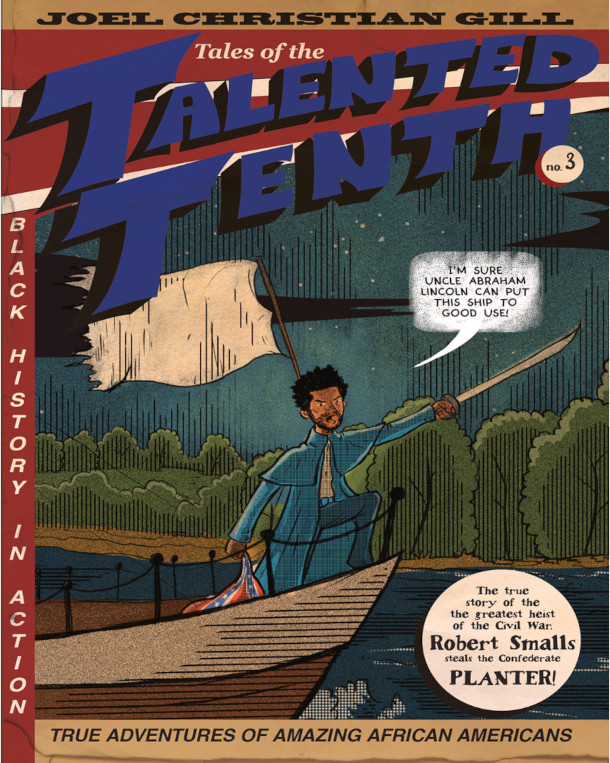
The cover of Tales of the Talented Tenth No. 3: Robert Smalls, by Joel Christian Gill. (Photo: Courtesy of Joel Christian Gill)
Host Steve Curwood and guests Michael B. Moore and Admiral Cecil Haney continue their conversation about Robert Smalls and are joined by Joel Christian Gill, a cartoonist and historian who authored a graphic biography about Smalls. They discuss Robert Smalls’ legacy, the current enslavement of nature, and how his courage relates to the courageous action and leadership that is now urgently needed to deal with the climate emergency.
Transcript
CURWOOD: It’s Living on Earth, I’m Steve Curwood.
CURWOOD: We’re back now with more from our discussion about the amazing story of Robert Smalls, who escaped from slavery in 1862 by piloting a commandeered Confederate ship past Fort Sumter into the Union blockade lines and freedom. Artist and historian Joel Christian Gill was so inspired by Robert Smalls’ story that he decided to make it the focus of the third volume of his graphic biography series Tales of the Talented Tenth. By the way, the term “Talented Tenth” was coined by a white philanthropist and popularized by W. E. B. Du Bois in a 1903 essay. Du Bois argued liberal college educations for Black elites would uplift all African Americans in society, in contrast of the views of Booker T. Washington who called for as many former slaves and their descendants as possible to get vocational educations. Joel Christian Gill, why do you find Robert Smalls’ story so compelling?
GILL: I mean, what doesn't attract you to Robert Smalls's story? Right? Like when you think about, like how in America, we've sold this idea, this fiction of the Horatio Alger story. Like there's this person who by great deeds of himself, he, he does something and he becomes a rich and wealthy man. That ain't real, right? But it is real for black people, right? And specifically for black people, enslaved Africans like Smalls. He was less than nothing. He was property. And by the strength of his character and his will, he made a way for himself. And like what's amazing, in a short period of time, he went from being an enslaved African, he probably couldn't read in that time. And then about a four- or five-year span, he saves his family, 13 other people, which is like the greatest heist of this Confederacy, right? That's like the equivalent of millions and millions of dollars, right? So he steals all these people and the ship. That would have been an amazing story in and of itself, but then he becomes a war hero. He saves the Planter from being destroyed when the captain, he took refuge in the engine room.

In March 2023, the U.S. Navy renamed a ship, formerly named after a battle won by the Confederacy, the USS Robert Smalls. (Photo: U.S. Navy, Public Domain)
CURWOOD: This was one of the Civil War battles, right?
GILL: Yeah. In one of the battles afterwards. You know, he does this, and then he becomes a politician. And what I think is really amazing, which we don't spend a lot of time in America talking about the idea of what these black Republicans were doing in reconstruction is that they were not focusing on what black people needed. They were building things for everybody. Like that law that he wrote that funded and made compulsory education in South Carolina statewide. That was for everybody. That wasn't just for black people. That was for everybody. And I think it's those kinds of things. There's one instance and I keep mixing it up. I don't know if it was Georgia or South Carolina, but the black Republicans were ejected from the Senate and the House. And when Ulysses S Grant comes back, and reinstates them, the first thing those black Republicans do is to pay for the people's time that were illegally sitting in their seats. Right, like the ultimate turning the other cheek. So, when you look at the period of reconstruction, it was like the first time in America, where we had a real clear and definitive time where we could have had pure and true racial justice in America that was destroyed by white supremacy. And I think that's the sad thing about that is because we put traitors on the names of our schools, like, you know, people who would have legitimately killed an American President, that would have been Robert E. Lee, or Fort Hood, you know, like any of these things that we're naming these Confederate generals after. These we're not Americans, they died not American citizens, and most of them gave up their American citizenship. But we have Robert Smalls, who embodies the American ethos of what it is to pull yourself up by your bootstraps. And also do things and provide service to the other people. And there's not a school in America that's named after him. Like where are the statues for Robert Smalls? And for folks like Robert Smalls, Blanche Bruce and Hiram Revels? Where are those people in our history? Because black people in America make America keep her promises. When we do things and when you do these things, it actually helps everybody, not just black people. And I'm just like, that's what attracted. I'm sorry, I'm on, I'm on a soapbox.
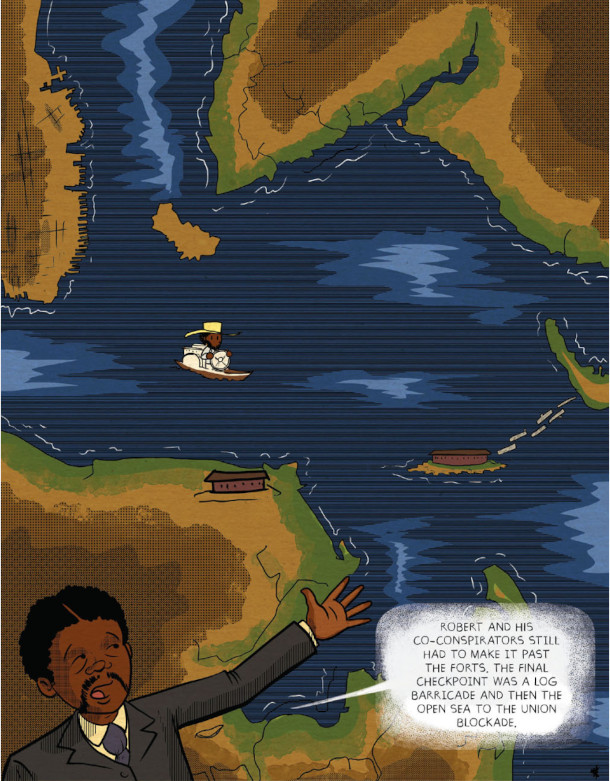
A page from Tales of the Talented Tenth No. 3: Robert Smalls. (Photo: Courtesy of Joel Christian Gill)
CURWOOD: Well, no, wait. So, I think to all of you here, the point that Joel has made is that Robert Smalls moved to have education for everyone to lead all people in South Carolina for better education. What is it that black America can do to make a better place for all of us? Because spoiler alert, I think we're still dealing with the white supremacy thing.
GILL: I think it's just continuing to demand more and to not, like for example, not accept things like Juneteenth. Right? You know, I say this a lot. And you know, if anybody's ever heard my rant, I always say like, it's like black people in America are in prison. And we're saying, hey, please let us out, please let us out. And they say, well, we'll give you a cake. So, you can have cake while you're in prison. And that's, that's what Juneteenth is, right? Like, I don't need a holiday to cook out. I can do that by myself. Right? And we've all been doing it right. Juneteenth has been a holiday for black people, for at least last 150 years. We didn't need the federal government to say it was a holiday, we've been drinking red strawberry soda, and cooking out and dressing in fancy clothes for a long time. We didn't need that. Right? What we needed was the end of mass incarceration. What we needed is like an acknowledgement of the wealth gap. What we need is like speaking about environmental issues. Look at poor health outcomes of black people in communities where there's pollution, right? We don't do stuff like that. We don't deal with environmental racism. We don't deal with any of these things. We just say, oh, but you got Juneteenth now. So, we're gonna give you some cheesecake ice cream and everything's gonna be okay.
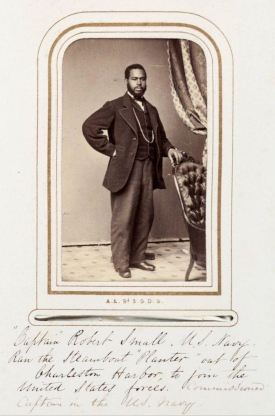
Returning to South Carolina after the war, Smalls was elected to the state House and Senate, and then to the U.S. House of Representatives. (Photo: Courtesy of Michael B. Moore)
CURWOOD: All right.
MOORE: Yeah, I would jump in and say I think you know, the story of Robert Smalls presents an appropriate model for how people who care about justice, who care about, you know, equality, you know, just how we need to act. Robert didn't just sort of sit back on his laurels and he deserved to relax and to live a really comfortable life, but he rolled his sleeves up and he got back into the fight. And he continued to try to do what he could to influence the process and to make America live up to her promises. And so, you know, I think democracy is, you know, a contact sport. It's a participative sport, like we've all got to be involved and got to pay attention. And so I think, Robert's example of coming from nothing, coming from, in some ways beneath nothing, and just striving and working and having his eyes fixed on a, an appropriate point on the horizon. I think that's something that can resonate with people today.
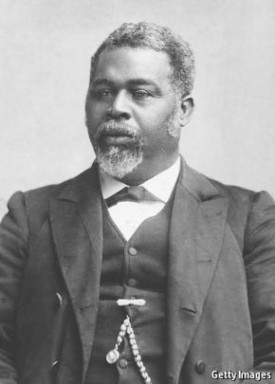
During his time in government, Smalls wrote legislation to create a free and compulsory education system statewide, the first of its kind in the U.S. (Photo: Courtesy of Michael B. Moore)
HANEY: Yeah, I agree. I think two points, the example of Robert Smalls and others like him, that had some incredible barriers placed in front of them, took advantage learned as much as they could, even without formal education, in order to reach a goal. And then after getting to that goal, went to work hard for the well-being of others, including others that didn't look like them. And you can look at that and say, Jim Crow, sort of compressed that. And then there's, you know, follow on rebounds and what have you. But I think we have to continue to talk about that, just like this program gives that exposure. I would argue a little bit differently with Juneteenth in that, with that recognition of a holiday, there are many black folks that didn't understand what Juneteenth was about, much less would Robert Smalls is about. So, if you don't have something like that, that puts a bit of an exclamation mark, a pause and say, let's talk about this. It gives more recognition to it. Imagine that. Slavery ends and you got over two years, before we get to Texas. A lot of understanding has to be digested there. And then with the spirit of Robert Smalls is we can't stop. We can't let those barriers just stay in front of us. We have to continue to self-educate, thrive, thirst for knowledge, and then work our way through and continue to press forward with it. And prayerfully, eventually we'll get there.
GILL: Yeah, I think you know, Dr. King said, the moral arc of history was long, but it bends toward justice. And I just think we need to pull it. We need to legitimately reach over and pull that toward us. And of course, if they had given me an opportunity to vote for Juneteenth, or Dr. King's holiday, or Black History Month, I would have voted for all of those things, right? But what those things do is they allow people to forget. To not have to pay attention. We would like the reflection, but we also want voting rights for people in South Carolina. And like those kinds of things, like, let's do some police reform, let's do some things that you know, like we can see racism happening in health outcomes, right? So we can see that this is actually physically affecting black people in America. And while, I love the fact that these people are saying, let's reflect on these things. But also, like, let's do something.
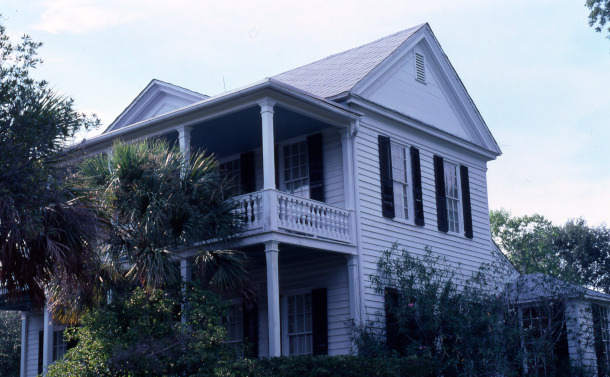
The house in Beaufort, South Carolina, where Smalls was born into slavery in 1839. He later purchased the house and lived there for the rest of his life. (Photo: National Park Service Southeast Regional Park Office, Public Domain)
CURWOOD: Well, this has been an amazing discussion. Perhaps we could go out and talk green for a moment, not just black and white, but green. Our society has enslaved nature, the way that people were enslaved in chattel slavery. And we have this resource-extraction mindset that we burn fossil fuels. And we do things that our society acts as if it's okay to do this, when in fact, if you look at the natural balance, it's not. Because by taking all that stuff that was put away millions of years ago, and putting in the atmosphere now, we are wrecking the kind of environment that us humans operate in, right? So, looking back at the story of Robert Smalls, and looking ahead, how can we break the chains of our enslavement to this totally dysfunctional, destructive way of handling our environment and most manifest right now by climate disruption? What are the tools that he showed us that all people could use now? How can we get ahead of this, or at least stay even with it?
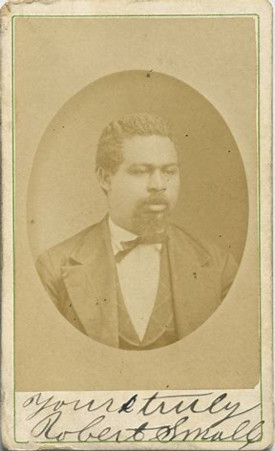
Smalls served five terms in the U.S. Congress. His time in government was cut short by a violent, white supremacist campaign to dismantle Black political power and civil liberties. (Photo: Courtesy of Michael B. Moore)
GILL: I'll just say something really quickly, I don't think we can rely on predatory capitalism to get us out of something that predatory capitalism got us into. So that means like, electric cars are not going to do it, you know, it's mass transit, that's going to decrease our dependency on carbon, right? Like, it's that kind of thing. We're gonna have to look for policies that are not about just a new, different way to make money. But we're going to have to do some things that are not involved in the market in and of itself, because when we don't have a Wall Street, when Wall Street is underwater, it's not going to matter what their market driven solutions, right? So, we're going to need to find solutions that are not necessarily based on predatory capitalism, which is what we're living in right now.
MOORE: Well, I'll take it from just the standpoint of just reiterating the fact that you know, I think the lesson that Robert Smalls showed us is that you know, amazing things can be done, created, established with vision, and with the audacity of hard work and just diligence. You know, one of Robert's perhaps most famous quotes was "my race needs no special defense, for the past history of them in this country proves them to be the equal of anyone anywhere, all they need is an equal chance at the battle of life." And I think even if you take a step back and broaden that, from focusing on people of African descent to sort of people in general, I think, to the point about predatory capitalism, you know, at the end of the day, the people have to create a meaningful counterbalance to so much of self-interest and greed, that is not good and not serving humanity.
CURWOOD: Admiral?
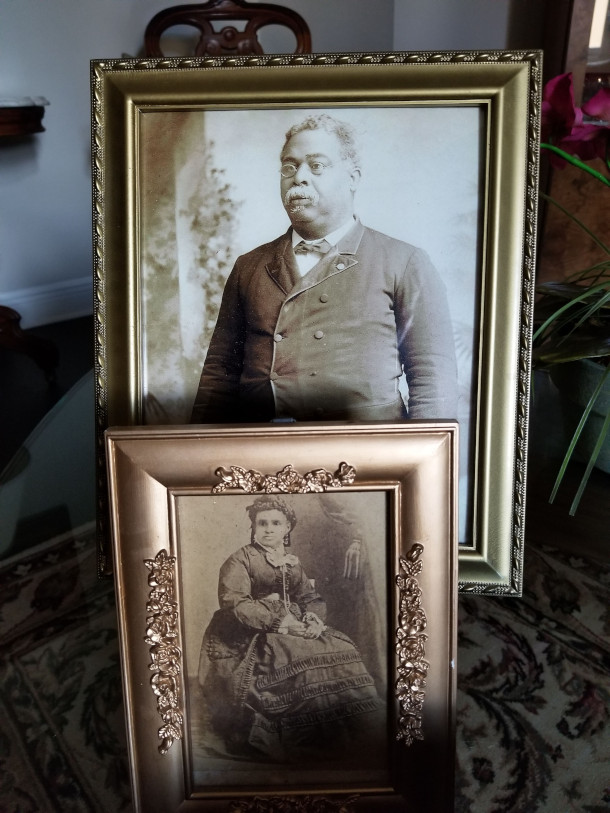
Speakers at the Living on Earth live event also discussed what Robert Smalls’ heroic work can teach us about fighting for racial and environmental justice today. (Photo: Courtesy of Michael B. Moore)
HANEY: I will try to approach it in a different sort of way. And I'll try to use Robert Smalls' example, and just this Planter approach that he had. You know, he had to convince a lot of people. I mean, the people that were part of his crew, to go forward against the risks that was in front of them, which meant he had to be a compelling leader, a thought leader, and a planning leader, who gave it probably a lot of introspection himself in going forward. So, when I look at this, looking at the concerns we have for our environment today, getting at it, it gets to be understanding the problem. I think about where we were in the Al Gore days to where we are today. And still, we have a long ways to go. And a lot of navigating to get there. It requires a lot of education and exposure. And being able to have that compelling argument out there in terms of we gotta go forward, and the emergency of fixing some things. And I think his example, can show us some of that, but then it's got to be expanded more, it's not just the United States and what have you. It's the world and how the world addresses this problem collectively, and recognizes it as a problem, really requiring leadership in a different way than we perhaps have had before in terms of this urgency of applying resources to it. It's interesting seeing the world look at COVID and the amount of money thrown into research, development, and what have you there to come up with vaccines and to study it, to understand and medicinals to get at it. Even for those who don't believe in the vaccinations to be able to help them. Well, that was a worldwide effort in many ways. That must continue. We have to have a real compelling worldwide effort going on in this area in so many of the facets that were discussed here. You know to get at this and the uncertainty of our future if we don't.
CURWOOD: You know, Admiral, it's just like you say here. With Robert Smalls, his choice was now or never. Our chance now with the climate is now or never.
[MUSIC: Elizabeth Cotton, “Vastopol” on Freight Train and Other North Carolina Folk Songs and Tunes, by Elizabeth Cotton, Smithsonian Folkways Records]
CURWOOD: Retired Four-Star Admiral Cecil Haney, Robert Small’s direct descendant Michael B. Moore and author Joel Christian Gill discussing the self-emancipation and legacy of Robert Smalls and what we can draw from this story for the challenges of our own time. For the full video of their Juneteenth Live Event with Living on Earth please visit loe.org/events
Links
Learn more about the life and work of Robert Smalls
Check out the Tales of the Talented Tenth series and other books by Joel Christian Gill
Living on Earth wants to hear from you!
Living on Earth
62 Calef Highway, Suite 212
Lee, NH 03861
Telephone: 617-287-4121
E-mail: comments@loe.org
Newsletter [Click here]
Donate to Living on Earth!
Living on Earth is an independent media program and relies entirely on contributions from listeners and institutions supporting public service. Please donate now to preserve an independent environmental voice.
NewsletterLiving on Earth offers a weekly delivery of the show's rundown to your mailbox. Sign up for our newsletter today!
 Sailors For The Sea: Be the change you want to sea.
Sailors For The Sea: Be the change you want to sea.
 The Grantham Foundation for the Protection of the Environment: Committed to protecting and improving the health of the global environment.
The Grantham Foundation for the Protection of the Environment: Committed to protecting and improving the health of the global environment.
 Contribute to Living on Earth and receive, as our gift to you, an archival print of one of Mark Seth Lender's extraordinary wildlife photographs. Follow the link to see Mark's current collection of photographs.
Contribute to Living on Earth and receive, as our gift to you, an archival print of one of Mark Seth Lender's extraordinary wildlife photographs. Follow the link to see Mark's current collection of photographs.
 Buy a signed copy of Mark Seth Lender's book Smeagull the Seagull & support Living on Earth
Buy a signed copy of Mark Seth Lender's book Smeagull the Seagull & support Living on Earth

